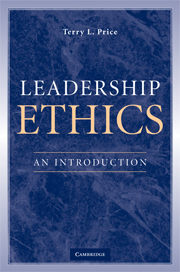Introduction
Published online by Cambridge University Press: 05 June 2012
Summary
BETWEEN THE VILLAIN AND THE HERO
Students of leadership ethics, whatever the particular context of study, face no shortage of examples. Politics offers bad leaders such as Richard Nixon. It also brings us murderous leaders such as Hitler and Stalin, each of whom was responsible for the deaths of millions of innocent people. From religion come not only charlatans such as Jim and Tammy Faye Bakker, but also destructive prophets such as Jim Jones and David Koresh, two leaders who ultimately led their followers to suicidal showdowns with the outside world. In business, the stakes are usually lower, but this context has its fair share of villains, too, with newcomers joining the list almost by the day: WorldCom's Bernie Ebbers, Tyco's Dennis Kozlowski, and Enron's Jeff Skilling.
Negative exemplars from politics, religion, and business make for frequent contrasts with leaders on the positive side of the ethical divide. Although there are sometimes disagreements about the real heroes of the moral story, Abraham Lincoln and Franklin Roosevelt are regularly cited for their moral accomplishments as presidents, and Martin Luther King Jr. has a central place in our understanding of ethical leadership for social change. All of these examples – the bad and the good – are standard fare in our day-to-day discussions of ethical leadership. But is working from villainous and heroic leadership the best way to think about leadership ethics in everyday life?
- Type
- Chapter
- Information
- Leadership EthicsAn Introduction, pp. 1 - 12Publisher: Cambridge University PressPrint publication year: 2008



